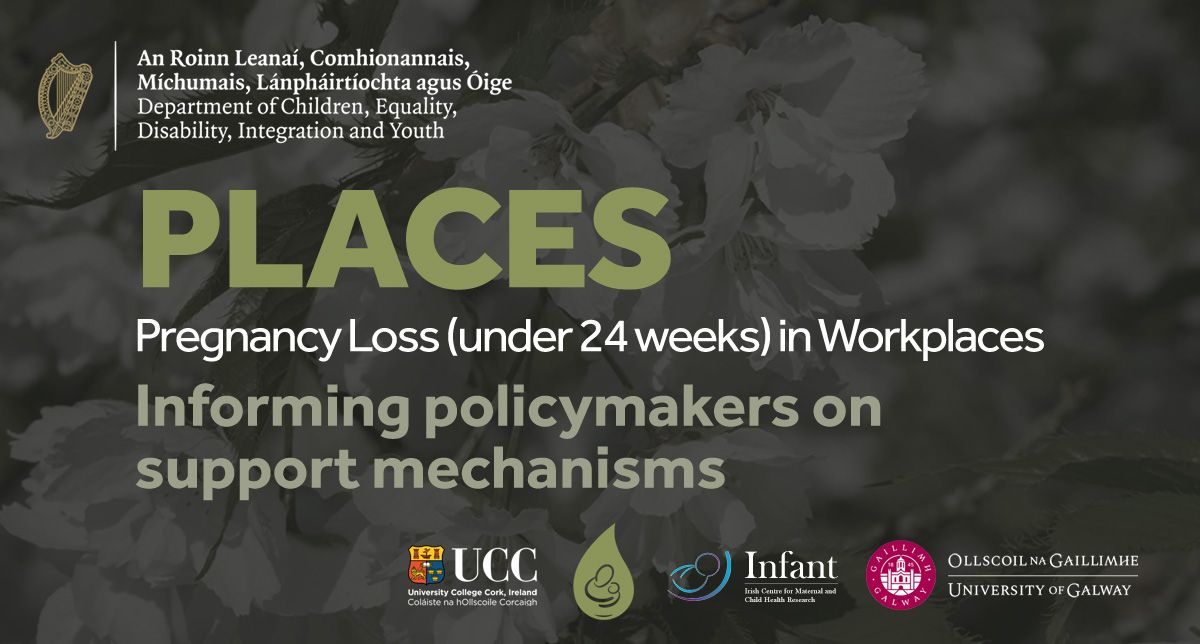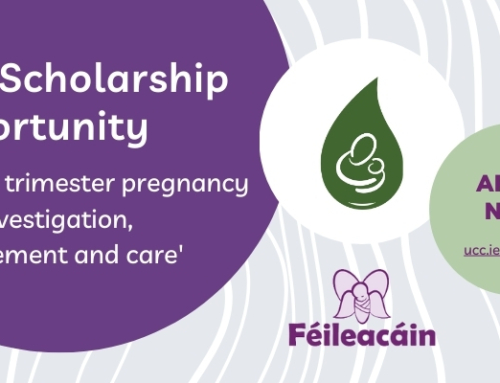A report commissioned by the Department of Children, Equality, Disability, Integration and Youth (DCEDIY), and authored by researchers at University College Cork and the University of Galway, has recommended that a statutory right to paid leave should be introduced for pre-viability pregnancy loss – regardless of the gestational stage or the reason for the loss.
As part of the PLACES (Pregnancy Loss in Workplaces: Informing policymakers on support mechanisms) project, researchers surveyed almost 1,000 people and interviewed 13 people who had experienced a pregnancy loss under 24 weeks. The report also draws on a review of international literature, statutory leave provisions for pregnancy loss, and pregnancy loss policies across a sample of companies in the Republic of Ireland.
Pregnancy loss affects approximately one in every four pregnancies, most often before 12 completed weeks of pregnancy. Pregnancy loss at any gestation can have physical impacts on the pregnant woman, and emotional and social impacts on the woman and her partner.
Of those who took part in the survey, 85% found it difficult to return to work, 95% said they would take paid pregnancy loss leave if it was available, and 85% would take it if certification necessary. A need for statutory, protected, paid leave was expressed by most participants, as well as other workplaces supports such as policies and guidance, training for management and staff, and flexible working arrangements.
In addition:
- People described how the emotional and/or physical impacts of pregnancy loss affected their ability to work, to carry on with normal life, and manage social interactions in the workplace
- Many took time off work, which was important for physical and emotional recovery
- Often people felt they had to return to work before they were ready due to lack of leave
- Many participants anticipated negative reactions relating to disclosing their loss, including insensitive comments and discrimination at work.
The researchers proposed nine recommendations for Government to consider in developing workplace supports for people who experience pregnancy loss under 24 weeks, including statutory leave provisions. These are contained within the report published by DCEDIY.
Speaking on the publication of the report, the Minister for Children, Equality, Disability, Integration and Youth, Roderic O’Gorman TD said:
“This project is a vital piece of research which provides recommendations as to how we can ensure those who experience a pregnancy loss while in employment are adequately supported in their employment. This research project is very informative and will assist the creation and implementation of policy in this area. I would like to thank those who took the time to share their experiences in the survey and the interviews. Their contribution was key to this report.”
Professor Keelin O’Donoghue, Consultant Obstetrician at Cork University Maternity Hospital, Lead of the Pregnancy Loss Research Group, and Principal Investigator of the PLACES project said:
“We are very proud of this work now published by Minister O’Gorman. We hope that voices of participants will be listened to, and our recommendations for workplaces, legislation & policy acted upon by Government. Statutory leave would allow for a period of recovery, and would also show societal recognition of the impact of pre-viability pregnancy loss.”
Further recommendations outlined within the report, of which there were nine in total, include:
- Any leave introduced should be of sufficient duration to meet the needs of those affected
- A statutory right to paid leave for pregnancy loss should be introduced for partners
- Statutory leave for pregnancy loss should be added to the list of family/care-related leaves which are covered by the Unfair Dismissals Act
- People with lived experience of pregnancy loss should be involved in the development of workplace policies and practices
- The implementation of leave entitlements should be carefully considered by workplaces – procedures on notification, submitting certification, and requesting leave should be developed with sensitivity to the needs of individuals experiencing pregnancy loss
- Additional supports and accommodations should be made available to workers experiencing pregnancy loss through organisational policies and practices, with guidance from relevant Government departments
- Information about leave and support entitlements for pre viability pregnancy loss needs to be clear, publicly available and accessible
- Political leadership is needed to drive changes in public awareness and perceptions surrounding pregnancy loss.
The full report is available to view/download on the DCEDIY website, where you can also read their press release.
More information about the PLACES project
The PLACES project – Pregnancy Loss in Workplaces: Informing policymakers on support mechanisms, was led by INFANT PI Professor Keelin O’Donoghue in collaboration with colleagues across University College Cork and the University of Galway. Conducted between September 2022 and September 2023, it sought to examine the workplace experiences of pregnancy loss before 24 weeks gestation (i.e. miscarriage, ectopic pregnancy, molar pregnancy, termination of pregnancy), and to identify needed supports. The rationale for this focus on earlier pregnancy loss was that people who experience pregnancy loss from 24 weeks gestation (i.e. stillbirth or neonatal death) are entitled to full maternity and paternity leave whereas no statutory leave is currently available for pregnancies ending before this gestation.
The PLACES project was commissioned within the context of the Organisation of Working Time (Reproductive Health Related Leave) Bill 2021 (Bill 38 of 2021). This Bill proposes a period of paid leave consequent upon miscarriage or for the purposes of availing of reproductive healthcare, up to 20 and 10 days, respectively. On 24 January 2024, members of the Dáil voted in support of an amendment to the Bill put forward by the Minister of State at the Department of Enterprise, Trade and Employment, Deputy Neale Richmond, which sought to delay debate on the Bill for 12 months. The reason given was allow for time for the Government to develop legislative proposals following publication of the PLACES report.
Publication of the report follows its submission to the DCEDIY in September 2023 and a briefing of members of the Oireachtas on the findings of the PLACES Project by members of the research team in late November 2023.
The PLACES Research Team comprised: Professor Keelin O’Donoghue (PLRG, INFANT), Ruadh Kelly-Harrington (PLRG, INFANT), Marita Hennesy PhD (PLRG, INFANT), Dr Sara Leitao (National Perinatal Epidemiology Centre; PLRG), Dr Daniel Nuzum (PLRG), Dr Caroline Dalton-O’Connor (School of Nursing and Midwifery, UCC), Professor Mary Donnelly (School of Law, UCC), Dr Claire Murray (School of Law, UCC) and Dr Maeve O’Sullivan (JE Cairnes School of Business & Economics, University of Galway).







